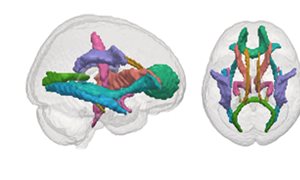
Most studies on healthy cognitive aging focus on mean performance - How well younger and older people perform certain tasks on average. However, a key finding is that older people, including those who age healthily, tend to be more variable: their performance shows more ups and downs over time. New research by scientists from the Radboudumc and Leiden University published in the Journal of Neuroscience on 6 April suggests that the quality of connections between brain regions may play a key role in this process.
The ‘neural noise hypothesis’ suggests that the quality of brain connections affects not just how quickly messages travel, but also how consistently they are passed along. The team of researchers from the Lifespan Cognitive Dynamics lab at Radboudumc, led by Rogier Kievit, tested this hypothesis in the Cam-CAN cohort (https://www.cam-can.org/) by examining how healthy adults performed a simple task, pressing a button as quickly as possible whenever a light appears, across 50 attempts. Crucially, they also used Magnetic Resonance Imaging scanners to study differences in how the connections in the brain (axons) are insulated by fatty tissue called myelin. The expectation was that better insulation is associated with faster (because brain signals can travel more easily) but also more consistent (because of less noise interference) responses to the lights.
Ethan McCormick, first author on the paper, explains: ‘Using statistical models, we could separate mean performance (how quickly people pressed on average) from variability (how different each of the 50 trials were). We found that younger people tended to be a bit quicker, and less variable than older individuals. However, we found that older individuals with better brain connections tended to be quicker, and more consistent, highlighting the role of brain connections in promoting fast and consistent performance across the lifespan’.
Read the study here
McCormick, E. M., Cam-CAN & Kievit, R. A. (2023). Poorer white matter microstructure predicts slower and more variable reaction time performance: evidence for a neural noise hypothesis in a large lifespan cohort. Journal of Neuroscience. 2023 Apr 6;JN-RM-1042-22. doi: 10.1523/JNEUROSCI.1042-22.2023. PMID: 37028933
Related news items

Three Vici grants for Radboudumc researchers
20 February 2020 Christian Beckmann, Sander Leeuwenburgh and Annette Schenck each receive a 1.5 million euro Vici research grant from NWO. go to page
Judith Homberg appointed Professor of Translational Neuroscience
20 March 2019 Judith Homberg has been appointed Professor of Tanslational Neuroscience effective 1 February 2019. go to page
Who is the average patient with ADHD? Does he or she exist?
4 March 2019 In Psychological Medicine Thomas Wolfers and André Marquand showed that the average patient with ADHD does not exist biologically. go to page


